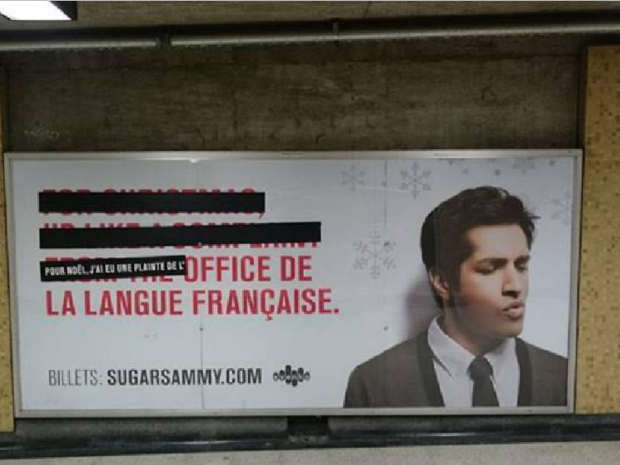DOSSIER DE PRESSE
Recherche

Some Quebecers can't take a joke
Last week, Quebec comedian Sugar Sammy riled hard-line nationalists in the province by placing English-language advertisements in the Montreal metro system, basically daring people to complain to the language police.
Now, before I immerse myself in the quagmire of Québec language politics, a cesspool no one ever emerges from unscathed, let me say this: While I would prefer to live in a world where language laws were not needed, where local mores were strong enough to withstand pressure from behemoths such as American culture and the English language, I recognize that sometimes a little help is needed to manage cultural co-existence in a globalized world.
Such is the case in Québec and, indeed, the rest of Canada. It is also the case in Israel, Spain, Italy, South Africa and Singapore, Denmark, Russia, Belgium and some parts of the United States. There are approximately 500 different language laws in existence throughout the world. Québec is far from alone.
Protecting minority languages and cultures means protecting diversity. I can't argue against that.
This being said, I welcomed Sugar Sammy's the latest “scandal,” perpetrated against le fait français au Québec (the French fact in Quebec), as a means of promoting his new round of shows, one bilingual, the other in French only.
Sugar Sammy is a classic case of what is known as a child of Bill 101. He was born in Montreal to Indian immigrant parents. Because his parents were not educated in English in Canada, he had to attend French school. As a result, he speaks perfect Hindi, Punjabi and English, and his French is indistinguishable from native-born French speakers. He just looks different. His Christmas-themed billboard campaign shows him dressed as a cute gingerbread man with the tag line, in French, “Give the man who smells of spices.”
His mastery of language and Québec cultural codes allowed him to build a career as a francophone comedy star. He even has a hit comedy show on French TV, Ces gars-là(those guys) with his buddy and fellow comedian Simon-Olivier Fecteau.
Two years in a row, Sugar Sammy was voted French Québec's favourite comedian, despite the fact that a fair amount of his routine is built on making fun of pure laine Québécois and sovereigntists. And immigrants, Indians and Anglos. Just about anything that breathes, in fact.
Sugar Sammy is also a star in India, New Zealand, Australia and in the Arab world, and he is gaining ground in English Canada and the U.S. The American website Askmen.com called him “Comedy's new rock star” — proof of his definite handsomeness and sexiness.
Last week, local news were abuzz with Sugar Sammy, thanks to a brilliant promotional campaign in Montreal metro stations conceived by Canada's top ad agency, Montreal-based Sid Lee. The provocative posters show Sugar Sammy asking, in English, for a complaint to the Office de la langue française (OQLF) as a gift for Christmas.
Self-styled social justice activist lawyer — and Charter of Québec values promoter — François Côté, granted him his wish and lodged a complaint with the OQLF. The next day, Sugar Sammy's English message was covered with black strips, with the words, “For Christmas, I got a complaint from the Office de la langue française,” in French this time. Which, technically, made the complaint null and void.
English ads are not allowed by law, unless they promote English-language cultural or educational events. And one of Sugar Sammy's shows, You're gonna rire, is in French and in English, allowing the OQLF to wiggle out of another Pastagate.
Hard-line nationalists went nuts, calling the ads a political manifesto and open warfare against French Québec. One described Sugar Sammy as a militant federalist. François Côté, who says he doesn't mind English when spoken in private, wrote in my newspaper, Le Journal do Montreal, that Sammy had ridiculed, not only Law 101, but also the national identity it seeks to protect.
In response, I wrote that this reminded me of ayatollahs who want to see jokes against religion banned by law. The Société Saint-Jean Baptiste, a nationalist umbrella group, shot back that Sugar Sammy was spitting in the face of French-speaking Québécois.
So, beyond the rhetoric and the headlines, how did the average Québécois react to Sugar Sammy's publicity stunt? By lining up to buy one of the extra 40,000 tickets put on sale for his shows. Rumour has it that they're almost all gone, for a total of 300,000 tickets sold.
Some lucky people are going to get Sugar Sammy tickets for Christmas, while he laughs all the way to the bank, leaving hard-line nationalists to wallow alone in humorless self-pity.








